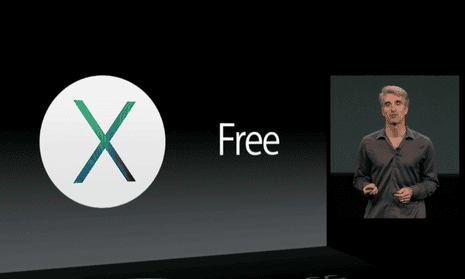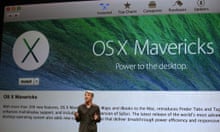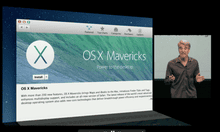The launch of a new version of Mac OS X is normally an exciting time for members of the development community.
The pre-release software they have been using for the last few months will be opened up to the wider world, and they can start making the most of all the fancy new features to improve their applications.
But with every release there is also a smaller group of developers who aren't quite so happy, because Apple's update renders their own apps obsolete.
OS X Mavericks, released on Tuesday 22 October, includes a number of additional features which had previously been a key selling point for specific apps. From major system features like iCloud Keychain, which synchronises saved passwords across multiple devices, to smaller tweaks like the introduction of tabs in Finder windows, most of those are also offered by independent developers.
"We expected this to come," says one such developer, Antonin Hildebrand. Hildebrand is the chief programmer of TotalFinder, an app which, among other things, adds tabbed browsing to the Finder. "Tabs in Finder is such an obvious feature that it cannot be called duplication … I personally expected tabs in Finder to appear in Lion. Apple gave us a good two years to serve this niche."
Hildebrand is resigned to the fact that Apple has knocked out a key selling point for his app – "We will definitely lose many customers" – but emphasises that TotalFinder still has advantages over what Apple offers.
We aren't worried
It's a common refrain amongst developers placed in a sticky situation. "There's a huge list of other stuff that Moom does that Mavericks doesn't," says Rob Griffiths, a partner at developers Many Tricks. Moom, one of the company's programs, is favoured by users who have multiple monitors and want to have a different app running full-screen on each – a feature now built in to Mavericks.
"You can lay out your windows as you like, save that layout, and call it up when you wish. You can even have the layout activate automatically when you add or remove a display, as many do with laptops … I think you get the idea: we're not worried about Mavericks impacting Moom in any negative way."
Some developers are even more upbeat, arguing that Apple moving onto their turf will be an overall positive. "To be honest, we're pretty excited Apple is talking about strong passwords again," says David Chartier, from AgileBits, developers of 1Password. With iCloud Keychain, Apple seems to be on the cusp of taking much of AgileBits' business, but Chartier doesn't see it that way.
"The good news is that the world listens when Apple speaks, so now the world is listening to the need for strong, unique passwords. As they say, a rising tide lifts all ships."
Like Hildebrand and Griffiths, Chartier emphasises his company's unique additions. 1Password works with browsers other than Safari, operating systems other than Mac OS, and offers features beyond just password syncing. "1Password is truly a full-featured identity manager with features like Secure Notes, Multiple & Shared Vaults, and Wi-Fi Sync, a way to remain in complete control of your data so it never leaves your network or ends up in the cloud."
Sherlocked
All three developers are in a position common enough that it even has a name in the community. They have been "sherlocked".
The term comes from 2002, when Apple updated Sherlock, an app built into OS X which searched users' computers and the web for them. Users noticed similarities between the new version 3.0 and Watson, a competing program developed by Karelia Software.
"Many users have contacted Karelia, congratulating us on Apple ‘buying out’ Watson. However, Karelia Software was not involved in any aspect of Sherlock 3, other than serving as … shall we say … inspiration," the company wrote at the time. But they were sanguine.
"With the addition of the new Google searching Tool for Watson – much more useful than the web-searching feature that is part of Sherlock 3 – we are confident that Watson will continue to be the market leader in web services, in spite of Sherlock 3."
Sadly, Watson rapidly lost market share, and in 2004, Karelia discontinued the software.
But not every program duplicated by Apple suffers the same fate. In 2011, the company upgraded its mobile operating system to iOS 5, and included a new feature called Reading List. Allowing users to save articles to read offline across multiple devices, it looked sure to put paid to the burgeoning field of ‘read-later’ apps, such as Instapaper, Read It Later (now Pocket), and Readability.
Instead, Chartier's prediction came true. Users, having been introduced to the concept of saving an item and reading it at their leisure, rapidly outgrew the tools Apple offered, and switched to dedicated apps. Pocket, which had 4.5 million users in April 2012, now boasts over 10 million.
What makes the difference? Why did Watson die while Pocket soared?
It helps if Apple's intervention into a field increases awareness of it, rather than simply doing a job previously done by others. When the company started shipping the Mail app with Macs in 2001, few will have seen it and been inspired to start using email, instead merely switching from previous paid apps to the free option.
But even if Apple does introduce users to a new type of program, that counts for nothing if developers can't offer a reason to upgrade. "One example: is that anyone can use QuickTime to record screen movies in Mountain Lion or Mavericks … yet ScreenFlow is doing a great business, because they offer so much more," says Griffiths. "In general, you've got to offer a compelling feature that people feel is worth paying for. That's a tough thing to do, but some have managed to do quite well with it."





Comments (…)
Sign in or create your Guardian account to join the discussion